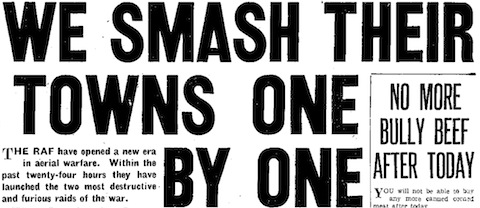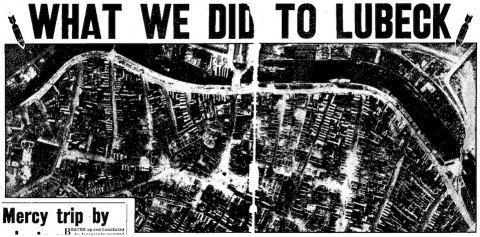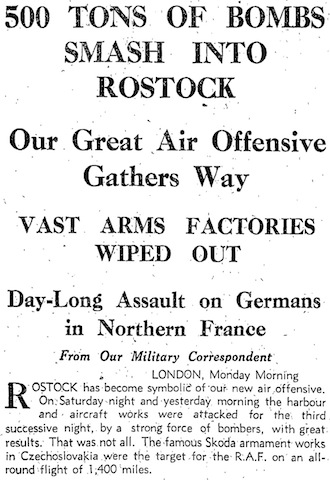
Lots of interesting things in today’s papers about the campaign in Burma, the future of India, Anzac Day, and so on — but there’s also a lot on bombing, so I’m going to talk about that. The predominant theme is, as the Daily Mirror‘s front page headlines above claim, that Bomber Command is now delivering exceptionally heavy blows against enemy-held cities (one, Flushing or rather Vlissingen, is actually in the Netherlands, not Germany, though the Mirror doesn’t mention this):
THE RAF have opened a new era in aerial warfare. Within the past twenty-four hours they have launched the two most destructive and furious raids of the war.
While Rostock, the German Baltic supply base for the Russian front, was still burning following one hour of concentrated bombing in the early morning, Fighter Command yesterday carried out their biggest ever single offensive.
In this day attack swarms of Spitfires took a force of Boston bombers to smash the docks at Flushing.
Inside there is more detail on the Rostock raid, which was carried out by ‘A strong force of Stirling, Whitley, Wellington, Hampden, Manchester and Lancaster bombers’ (5):
An overmastering concentration of bombers was brought over the town and within the appointed hour, from about 2 a.m. yesterday onwards, fires had raged across the port and burned fiercely in the Heinkel aircraft works.
Towards the end of the attack clouds of smoke went up more than 8,000ft. Many crews went down to a low level and those who bombed from a greater height saw bombers far below them looking almost as they were flying between the flames.
British casualties were ‘light’, with only four bombers lost.
The effect of such a raid is emphasised by this aerial reconnaissance photograph taken of Lübeck ‘with the roofs off’ (5) after a heavy raid a month ago, spread across pages 4 and 5. Note the little bombs on either side of the headline ‘WHAT WE DID TO LUBECK’ (which continues to the right as ‘AND NOW THE SAME TO ROSTOCK’.) The caption notes Lübeck’s industrial significance, with its ‘naval stores, equipment and fuel oil, and submarine building yards’ (5) and its status as a port shipping supplies and men to the Russian front. A warehouse was destroyed and ‘quay buildings have been severely damaged’. But it seems to me that this is not what is emphasised. The Mirror claims that ‘No city in Britain has suffered so much in a single air attack as this Baltic port did at the hands of the RAF on March 28’, and goes on to say:
THIS inner town of Lubeck shown in the photograph is on an island of about a square mile. About 40 per cent. of it, mainly three to five-storey buildings, was devastated. Only shells are left of about 1,500 houses, the town hall, the Reichsbank. Debris still chokes streets a fortnight after the raid.
The damage done to the non-industrial and non-military parts of Lübeck is not minimised; quite the opposite:
THE suburbs, not shown in the photograph, were also hit, and 500 houses were destroyed. Seven blocks of flats were smashed by a single heavy bomb. Total population of Lubeck was 150,000.
Note the tense of that last sentence: ‘Total population of Lubeck was 150,000’. I don’t think it’s by accident — the caption also uses the past tense when talking about the population of the inner town shown in the photograph (35,000). There is an implication here that the population has been reduced appreciably.

But then again Zec’s cartoon today (3) has ‘R.A.F.’ bombs raining down on ‘NAZI INDUSTRY’ protected ineffectually by Goering’s ‘LUFTWAFFE’ umbrella.
Let’s see how other newspapers treat the same news. The Times carries the same photograph of Lübeck, describing it as showing ‘the complete destruction of about 200 acres of the old, or inner town […] Many important buildings and works were destroyed’ (8). A fuller report on another page, by the air correspondent, does admit that ‘It would be idle to pretend that the devastation was confined to industrial targets, for the photographs show street after street to have been gutted’ (3). It carries the same story about Rostock as the Mirror (‘overmastering concentration’ etc) but a preceding article, again from its own air correspondent, downplays civilian casualties (4):
Hundreds of aircraft, including four-engined bombers, concentrated their attacks on the shipbuilding yards, docks, and wharves and on the vast Heinkel aircraft works on the outskirts of the town.
Similarly its report on the Flushing raid says the British bombers made ‘direct hits with their bombs on large buildings in the docks and on the pier’. (It also omits to mention that Flushing is in the Netherlands, so maybe it’s just that everyone knew where it was.)
The Yorkshire Post says of the Lübeck raid that ‘about 40 per cent. of this inner town (about 200 acres) has been devastated and 1,500 houses destroyed’, with another 500 destroyed in the suburbs ‘including blocks of flats or tenement buildings’ (1), but does not draw attention to the civilian nature of these targets.
The Manchester Guardian quotes the Air Ministry News Service report on Lübeck in full, including a couple of sentences the other newspapers seem to have left out (4):
Thousands have now been made homeless, and in many instances their means of livelihood are gone. The Germans themselves have admitted that it will take years to rebuild Lübeck.
This also shows that the past tense used by the Mirror didn’t come from the Air Ministry, for it says ‘The population is about 150,000’. Interestingly, the Guardian gives priority to the Flushing raid to the Rostock one, though otherwise it has much the same text as the other papers — except for adding (7) that
One report says that the greatest weight of very heavy high explosives ever crowded into an hour was dropped on Rostock.
The only other newspaper (of those available to me) which exults in the news of the destruction of German cities is the Daily Express. Its front page headline for the Rostock raid is
HELL-RAID SMASHES ROSTOCK IN 1 HOUR / BALTIC WAR PORT BLITZED
and for Lübeck’s postmortem (4)
LUBECK — 40% IS NO MORE / 200 acres vanish in biggest blitz of all
The article about the destruction of Lübeck, by the Express‘s air correspondent, opens:
THIS is what happened to the city of Lubeck, where 150,000 Germans live and work, on the night last month when the R.A.F. decided to render an English translation of the word ‘blitz’.
However, again like most of the papers, it doesn’t dwell on who got blitzed, other than to say that the old town was ‘packed with what were mainly three-to-five storey houses, shops, and public buildings’. It seems that only the Mirror and, to a lesser extent, the Times are willing to admit what the bomber war means.
Of course it’s not just Germany (and the Netherlands) which is getting bombed. Page 4 of the Times notes air raids on Malta (by the Germans), Port Moresby and towns in Kiangsi and Chekiang provinces (by the Japanese). One particularly strident (though brief) article reports on Japanese raids in Burma, which seem ‘to be intended to spread panic and alarm among the population’:
By their ruthless bombing of civilians throughout Burma the Japanese are laying up for themselves a terrible reckoning when the tide turns. They have now methodically bombed almost every major town in the country. Sweeping over at a great height usually about midday, they drop their bombs often in the crowded bazaar areas.
Britain also suffered aerial attacks yesterday, though where exactly is (as usual) unclear. There is also a report that, early this morning, ‘Bombs fell in a working-class district of one town’, with no clues as to its location (Guardian, 7). For (at least) the third night running there was enemy activity last night over the southwest of England, and ‘It is feared that there were some casualties’. Some details are now available of casualties in Thursday night’s raid in ‘a South-west town’ (which may or may not be the same southwest town bombed last night, it seems to have been near the coast as that’s where the raiders ‘mainly’ flew):
Three fire-watchers, including a father and son, were among five persons killed by bombs […] Other fire-watchers were knocked down when a bomb fell near by, but within a few moments they were rescuing seven evacuee children, who were unhurt, from a damaged house.
Bombs were dropped at several places. Eight people in an institution were killed in one town. Many houses were damaged. Four children in a Morrison shelter were unharmed though the shelter was completely buried.
In addition, a pair of Me 109 fighter-bombers attacked a town on the south coast of England last evening. They dropped bombs which injured two workmen, and
The raiders then swept at a low level over the town, firing cannon shells which caused slight damage to property. A woman was injured in the hand trying to protect her baby as the cannon shells clattered among a shopping centre. The child was wounded in the head by a splinter.
If it’s frustrating trying to work out when and where these raids took place from the scant details permitted by the censors, imagine how much worse it would be for those who have relatives in the southwest or the south coast.
![]() This work is licensed under a Creative Commons Attribution-NonCommercial-NoDerivatives 4.0 International License.
Permissions beyond the scope of this license may be available at http://airminded.org/copyright/.
This work is licensed under a Creative Commons Attribution-NonCommercial-NoDerivatives 4.0 International License.
Permissions beyond the scope of this license may be available at http://airminded.org/copyright/.





OT would you know off hand of any decent sound recording/audio/oral history sites regarding Galliploi/Anzac Day?
Ugh, I see that old ugly gravatar has followed me here.
Not really, but you might find some useful material here, videos rather than just audio: The Australians at War Film Archive (it’s rather vast though I suspect only a small fraction will relate to Gallipoli). There are a few more WWI oral history interviews here: Australians at War. Hope that helps!
Thanks very much.
Barry, I’m not clear if you’re after oral history / recordings on the battle of 1915 or the commemoration ever since. Either way, the Australian National Archives and the Australian War Memorial are two places with oral history archives that will cover both. I don’t know if recordings are indexed there, but Trove covers them and most other major state level collections in Australia. Worth a look. Our Kiwi brethren will have equivalent resources.
The first two are straightforward links, the last: trove.nla.gov.au/
Hope that helps.
Thanks, JDK, both actually though I’m more interested in the oral history part. I’ve poked around the Australian War Memorial site and I’ve seen some NZ sites.
Canada does this sort of thing extremely well, I was hoping to find the equivalent of something like this:
http://www.collectionscanada.gc.ca/first-world-war/interviews/index-e.html
Pingback: Airminded · Monday, 27 April 1942
Pingback: Airminded · Tuesday, 28 April 1942
Pingback: Airminded · Wednesday, 29 April 1942
Pingback: Airminded · Saturday, 2 May 1942
Pingback: Airminded · Tuesday, 5 May 1942
As a survivor of the raid on Luebeck on 28/29th March 1942 aged 12 years, I can assure you, hat there was no damage to any factory or wharf, port or rail facility in that city. A few houses were destroyed in near city suburbs, but that was it. What was destroyed was centuries old houses, churches and public buildings. Outer suburbs facturies, downstream along the Trave River were later attacked by thee USAF in day raids in 1943, factories like Dornier, BLM and MfM. Get your facts straight. Harris’ intent was purely to destroy the civilan resolve.
Hans-Heinrich:
Firstly, thanks for passing on your memories of the raid. It’s always a useful cross-check to have.
However, I think you may have misunderstood what I wrote in the post. It was part of an exercise where I looked at a number of British newspapers on a given day (in this case, 25 April 1942) and analysed what they said about strategic bombing, and doing that over a sustained period to build up a picture of what British people were being told about bombing. So the first thing is that it’s not me making those claims, it’s the British press. The second thing is that in fact one of the things I found for this period following the Rostock and Lübeck raids was that the press accounts were fairly open about the fact that German civilians were more or less targets along with the industrial capacity. If you’ll reread the post above you’ll see this — there are estimates of 40% of the town being destroyed, 1500 houses destroyed and so on. It’s true that they gloss over the possibility of civilian casualties, but it is implied: having lived through the Blitz themselves, readers would have known full well what destroying 1500 houses meant in terms of human lives. Finally, I partly agree with you about Harris, but only partly: as I’ve written before, he wanted to smash cities, as he thought that was the best way of destroying morale and production at the same time.